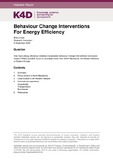| dc.description.abstract | Behavioural interventions are policies and programmes that incorporate insights from scientists who study human behaviour (such as psychology and behavioural economics), with the aim of encouraging socially desirable behaviours by removing barriers and creating incentives or disincentives (Cornago, 2021).
Very few behavioural interventions for energy efficiency have been documented in Eastern Europe and the Western Balkans, and none in North Macedonia. The limited experience that has been documented in the region consists of a few small trials which used behavioural principles to inform households about approaches to energy conservation, but none of these trials have demonstrated a significant effect on behaviour.
Behavioural interventions have been widely used elsewhere in the world, particularly in North America, Western Europe, and Australia, and there are many studies evaluating their impacts in these regions (Andor & Fels, 2018, p. 182).
This report focuses primarily on household energy efficiency, and particularly on the most widespread and well-documented interventions, which are those related to providing feedback on energy consumption and labelling consumer goods.
Although behavioural interventions have been shown to produce significant impacts and to be cost-effective in many situations, the available evidence has some limitations. Many examples that have been documented are small-scale trials or pilot projects; large-scale, institutionalised policy interventions based on behavioural insights are rare (Users TCP and IEA, 2020, p. 22). In many studies, experiments with small sample sizes and short durations show larger impacts than larger and longer-term studies, suggesting that pilot studies may over-estimate the savings that might be achieved by large-scale programmes (Andor & Fels, 2018, p. 182; Erhardt-Martinez et al., 2010, p. iv). The amount of energy saved by behavioural interventions is often fairly small and varies widely from one programme to another, suggesting that the effectiveness of these interventions may be highly dependent on local context and on details of design and implementation. Finally, many studies rely on participants reporting their intentions, and on hypothetical rather than actual purchasing decisions, and some studies have found a divergence between stated intentions and actual behaviour (Grünig et al., 2010, p. 41; Users TCP and IEA, 2020, pp. 75–76; Yang et al., 2015, pp. 21–22). | en |

